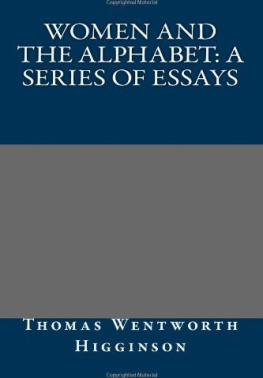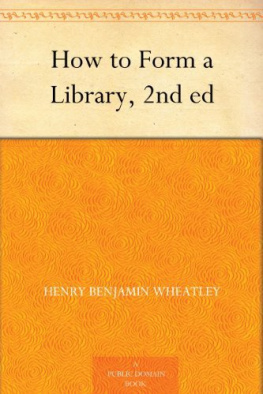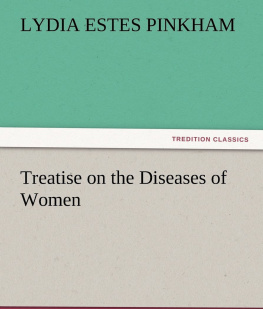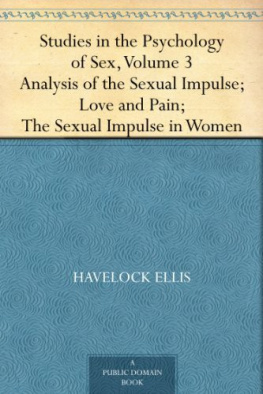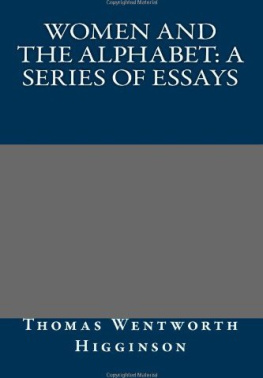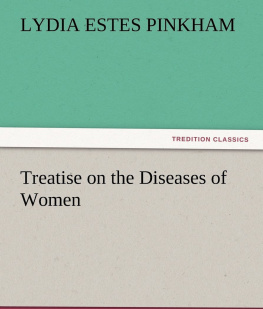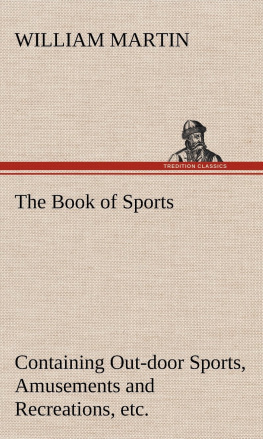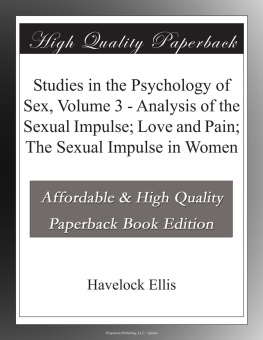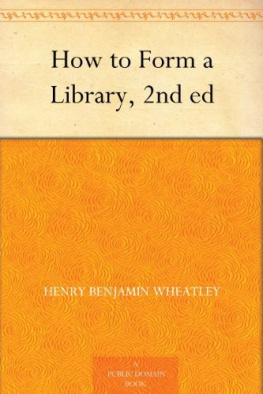The Project Gutenberg eBook, Women and the Alphabet, by Thomas Wentworth Higginson
This eBook is for the use of anyone anywhere at no cost and with
almost no restrictions whatsoever. You may copy it, give it away or
re-use it under the terms of the Project Gutenberg License included
with this eBook or online at www.gutenberg.net
Title: Women and the Alphabet
Author: Thomas Wentworth Higginson
Release Date: September 15, 2004 [eBook #13474]
Language: English
Character set encoding: ISO-8859-1
***START OF THE PROJECT GUTENBERG EBOOK WOMEN AND THE ALPHABET***
E-text prepared by Judith B. Glad
and the Project Gutenberg Online Distributed Proofreading Team
WOMEN
AND THE ALPHABET
A Series of Essays
BY
THOMAS WENTWORTH HIGGINSON
1881
PREFATORY NOTE
The first essay in this volume, "Ought Women to learn the Alphabet?" appeared originally in the "Atlantic Monthly" of February, 1859, and has since been reprinted in various forms, bearing its share, I trust, in the great development of more liberal views in respect to the training and duties of women which has made itself manifest within forty years. There was, for instance, a report that it was the perusal of this essay which led the late Miss Sophia Smith to the founding of the women's college bearing her name at Northampton, Massachusetts.
The remaining papers in the volume formed originally a part of a book entitled "Common Sense About Women" which was made up largely of papers from the "Woman's Journal." This book was first published in 1881 and was reprinted in somewhat abridged form some years later in London (Sonnenschein). It must have attained a considerable circulation there, as the fourth (stereotyped) edition appeared in 1897. From this London reprint a German translation was made by Frulein Eugenie Jacobi, under the title "Die Frauenfrage und der gesunde Menschenverstand" (Schupp: Neuwied and Leipzig, 1895).
T.W.H.
CAMBRIDGE, MASS.
CONTENTS
I. OUGHT WOMEN TO LEARN THE ALPHABET?
II. PHYSIOLOGY
Too Much Natural History
Darwin, Huxley, and Buckle
The Spirit of Small Tyranny
The Noble Sex
The Truth about our Grandmothers
The Physique of American Women
The Limitations of Sex
III. TEMPERAMENT
The Invisible Lady
Sacred Obscurity
Virtues in Common
Individual Differences
Angelic Superiority
Vicarious Honors
The Gospel of Humiliation
Celery and Cherubs
The Need of Cavalry
The Reason Firm, the Temperate Will
Allures to Brighter Worlds, and leads the Way
IV. THE HOME
Wanted--Homes
The Origin of Civilization
The Low-Water Mark
Obey
Woman in the Chrysalis
Two and Two
A Model Household
A Safeguard for the Family
Women as Economists
Greater Includes Less
A Copartnership
One Responsible Head
Asking for Money
Womanhood and Motherhood
A German Point of View
Childless Women
The Prevention of Cruelty to Mothers
V. SOCIETY
Foam and Current
In Society
The Battle of the Cards
Some Working Women
The Empire of Manners
Girlsterousness
Are Women Natural Aristocrats?
Mrs. Blank's Daughters
The European Plan
Featherses
VI. STUDY AND WORK
Experiments
Intellectual Cinderellas
Cupid and Psychology
Self-Supporting Wives
Thorough
Literary Aspirants
The Career of Letters
Talking and Taking
How to Speak in Public
VII. PRINCIPLES OF GOVERNMENT
We the People
The Use of the Declaration of Independence
Some Old-Fashioned Principles
Founded on a Rock
The Good of the Governed
Ruling at Second Hand
VIII. SUFFRAGE
Drawing the Line
For Self-Protection
Womanly Statesmanship
Too Much Prediction
First-Class Carriages
Education via Suffrage
Follow Your Leaders
How to Make Women Understand Politics
Inferior to Men, and near to Angels
IX. OBJECTIONS TO SUFFRAGE
The Facts of Sex
How will it Result?
I have all the Rights I want
Sense Enough to Vote
An Infelicitous Epithet
The Rob Roy Theory
The Votes of Non Combatants
Mmanners repeal Laws
Dangerous Voters
How Women will Legislate
Individuals vs. Classes
Defeats before Victories
I
OUGHT WOMEN TO LEARN THE ALPHABET?
Paris smiled, for an hour or two, in the year 1801, when, amidst Napoleon's mighty projects for remodelling the religion and government of his empire, the ironical satirist, Sylvain Marchal, thrust in his "Plan for a Law prohibiting the Alphabet to Women."[1] Daring, keen, sarcastic, learned, the little tract retains to-day so much of its pungency, that we can hardly wonder at the honest simplicity of the author's friend and biographer, Madame Gacon Dufour, who declared that he must be insane, and soberly replied to him.
His proposed statute consists of eighty-two clauses, and is fortified by a "whereas" of a hundred and thirteen weighty reasons. He exhausts the range of history to show the frightful results which have followed this taste of fruit of the tree of knowledge; quotes from the Encyclopdie, to prove that the woman who knows the alphabet has already lost a portion of her innocence; cites the opinion of Molire, that any female who has unhappily learned anything in this line should affect ignorance, when possible; asserts that knowledge rarely makes men attractive, and females never; opines that women have no occasion to peruse Ovid's "Art of Love," since they know it all in advance; remarks that three quarters of female authors are no better than they should be; maintains that Madame Guion would have been far more useful had she been merely pretty and an ignoramus, such as Nature made her,--that Ruth and Naomi could not read, and Boaz probably would never have married into the family had they possessed that accomplishment,--that the Spartan women did not know the alphabet, nor the Amazons, nor Penelope, nor Andromache, nor Lucretia, nor Joan of Arc, nor Petrarch's Laura, nor the daughters of Charlemagne, nor the three hundred and sixty-five wives of Mohammed; but that Sappho and Madame de Maintenon could read altogether too well; while the case of Saint Brigitta, who brought forth twelve children and twelve books, was clearly exceptional, and afforded no safe precedent.
It would seem that the brilliant Frenchman touched the root of the matter. Ought women to learn the alphabet? There the whole question lies. Concede this little fulcrum, and Archimedea will move the world before she has done with it: it becomes merely a question of time. Resistance must be made here or nowhere. Obsta principiis. Woman must be a subject or an equal: there is no middle ground. What if the Chinese proverb should turn out to be, after all, the summit of wisdom, "For men, to cultivate virtue is knowledge; for women, to renounce knowledge is virtue"?
No doubt, the progress of events is slow, like the working of the laws of gravitation generally. Certainly there has been but little change in the legal position of women since China was in its prime, until within the last half century. Lawyers admit that the fundamental theory of English and Oriental law is the same on this point: Man and wife are one, and that one is the husband. It is the oldest of legal traditions. When Blackstone declares that "the very being and existence of the woman is suspended during the marriage," and American Kent echoes that "her legal existence and authority are in a manner lost;" when Petersdorff asserts that "the husband has the right of imposing such corporeal restraints as he may deem necessary," and Bacon that "the husband hath, by law, power and dominion over his wife, and may keep her by force within the bounds of duty, and may beat her, but not in a violent or cruel manner;" when Mr. Justice Coleridge rules that the husband, in certain cases, "has a right to confine his wife in his own dwelling-house, and restrain her from liberty for an indefinite time," and Baron Alderson sums it all up tersely, "The wife is only the

